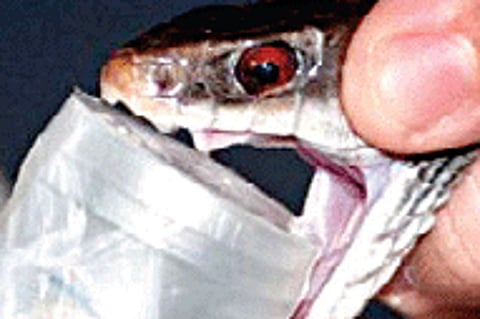

Hospitals in the city are reeling under a severe shortage of Anti-Snake Venom Serum (ASVS) since four to five months now and are clueless about how to bridge the gap.
The shortage has also pushed up the cost of the serum from `500 to nearly `2,000 per vial of 10 ml each.
Many factors have led to this shortage. Severe opposition from animal rights groups has led to a fall in extraction of the serum from snakes which is used by pharmaceutical companies to produce the chemical that counters the harmful effects of the venom in a snake-bite victim, government hospital authorities said.
Medical Superintendent at the state-run Victoria Hospital Dr Devadass P K concurs. Following the severe shortage of AVSM, he made a temporary arrangement for about 400 vials. “But they will not last long and we will have to look for alternate supplies,” he said. The hospital’s Out-patient Department gets at least two to three snake-bite victims a day.
Animal rights groups confirmed that there was a cap on using snakes to obtain the antidote and that anti-venom can be produced through kinder ways.
Science Policy Adviser for People for the Ethical Treatment of Animals (PETA) Dr Chaitanya Koduri said several companies in India are injecting horses with debilitating snake venom that causes them to go blind and die.
“Anti-venoms produced in this manner are expensive and require refrigeration. Snakes are captured and are abused repeatedly for their venom. The Government of India and companies should actively look into this kind of research instead of abusing animals,” he added.
Usually, hospital pharmacies present their requirements before the Bangalore Medical College and Research Institute (BMCRI) authorities who, in turn, call for tenders for the supply of the anti-venom serum. “But when we called for tenders this time around, there was no application. We have no choice, but to buy it from independent distributors as pharma companies are not coming forward to participate”, Director-cum-dean of BMCRI Dr Shivaprasad Reddy said.
‘Scarcity Created by Companies’
Dr Reddy said the scarcity of the antidote is an artificial one created by pharma companies which are trying to make money.
“Certain companies already have some stock with them and are holding it back. This way, they can sell each vial at a higher price,” he alleged, refusing to name the companies.
“In the interim, we have presented our requirements before the Karnataka State Drug Logistics and Warehousing Society which has initiated the procurement process,” he said.
In addition to Victoria Hospital, the BMCRI has Bowring and Lady Curzon Hospital, Vani Vilas Women and Children Hospital under it. These hospitals too are affected by the scarcity.
Chief Pharmacist at Victoria Hospital Nanjappa said a minimum of 1,000 vials are required per month to treat patients. “We called for 3,000 vials but now we are managing with emergency stocks,” he added. Even Bowring Hospital authorities have made temporary arrangements from independent agencies. Medical Superintendent Dr Syed Iqbalulla Sha Khadri said a ‘problem with manufacturing’ was the reason for the shortage.
No Shortage, Say Pvt Hospitals
Private hospitals, however, do not seem to be affected by the shortage. Dr Kumar Krishna Swamy, consultant emergency physician, Fortis Hospitals, said there was no shortage and that there was enough anti-snake bite serum available with them. “We don’t get the volume of snake bite victims like in government hospitals, but we have enough supplies, and even stand-by stock,” he said.
Patients Getting Smaller Doses
The shortage is affecting only government hospitals, while private hospitals have their own arrangements, Dr Veeranna Gowda, professor at the Department of General Medicine in BMCRI, said.
All hospitals get two types of snake-bite victims — poisonous and non-poisonous bites, he added. But not all of them require the antidote. “Each patient needs 20 to 30 vials of the serum. This is a referral hospital for snake bite victims and we are facing inadequate supply,” he said. The existing supplies are being stretched by administering lesser quantities per patient and giving it only to patients who have very serious bites.
“We check symptoms properly first. Bites of the King Cobra and Viper are poisonous and fang marks are deep. Only in such cases do we give anti-venom and instead of 10 ml, we give 5 ml and ask the patients to purchase the remaining dose from outside. We usually send patients back without it if the bite is by a non-venomous snake,” Dr Gowda explained.